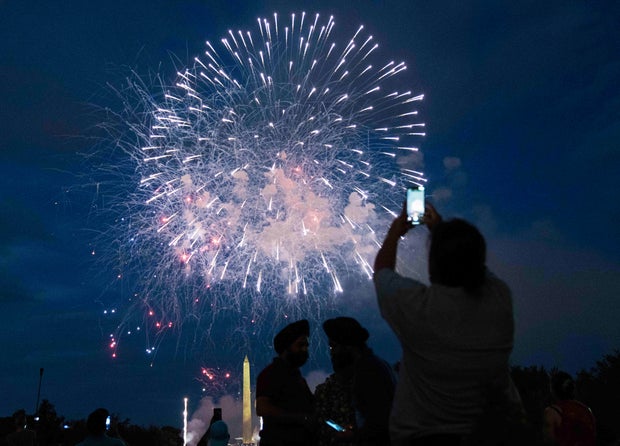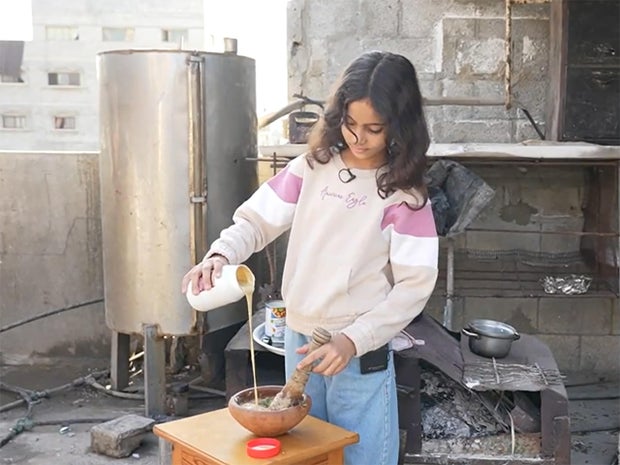CBS News
Map shows states where fireworks are legal or illegal on July 4, 2024

Fireworks have become a staple of July Fourth celebrations across the United States, where towns and cities often host professional shows to mark the occasion each year. In some areas, smaller displays of less powerful fireworks pop up at private holiday parties. For people wondering where fireworks are legal — and where they’re illegal — nationwide, here’s what to know.
Full list of U.S. states where some fireworks are legal
The U.S. Consumer Product Safety Commission has banned several types of fireworks — like M-80s, cherry bombs and anything else that contains more than 50 milligrams of pyrotechnic material — at the federal level, but state and local regulations can be more complicated. To varying degrees, certain types of fireworks are legal in 49 states, plus Washington, D.C.
Here’s the full list:
- Alabama
- Alaska
- Arizona
- Arkansas
- California
- Colorado
- Connecticut
- Delaware
- Florida
- Georgia
- Hawaii
- Idaho
- Illinois
- Indiana
- Iowa
- Kansas
- Kentucky
- Louisiana
- Maine
- Maryland
- Michigan
- Minnesota
- Mississippi
- Missouri
- Montana
- Nebraska
- Nevada
- New Hampshire
- New Jersey
- New Mexico
- New York
- North Carolina
- North Dakota
- Ohio
- Oklahoma
- Oregon
- Pennsylvania
- Rhode Island
- South Carolina
- Tennessee
- Texas
- Utah
- Vermont
- Virginia
- Washington
- Washington, D.C.
- West Virginia
- Wisconsin
- Wyoming
The one U.S. state where all private fireworks are illegal
Massachusetts is the only state in the U.S. where it is illegal to sell, use or otherwise possess fireworks of any kind as a private citizen. Many communities across the state host public fireworks displays at their July Fourth celebrations. But without a license and permit, the statewide law prohibits fireworks of all kinds, including sparklers, firecrackers and any other comparable device that’s been designed to produce “a visible or audible effect,” according to the state government.
The ban has existed since 1943, when state legislators amended an earlier set of statutes that previously allowed civilians to buy, sell and use certain kinds of fireworks for displays. When they enacted the fireworks ban, it was among an overhaul of measures enacted in response to World War II, some of which were billed as “emergency” orders meant specifically to remain effective as long as there was a potential enemy threat. But the the consumer fireworks law stayed in place after the war.
Despite periodic calls from within Massachusetts to lift the ban, officials say it continues to be necessary and have ramped up enforcement in recent years because illegal fireworks are prevalent. Between 2013 and 2022, Massachusetts fire departments reported almost 1,000 fires linked to illegal fireworks displays, in addition to 47 injuries — the majority to firefighters — and $2.5 million in damages, according to the state.
Minh Connors/The Washington Post via Getty Images
States where some fireworks are legal but many are restricted
Numerous states and Washington, D.C., restrict the sale, possession and use of consumer fireworks, even though professional fireworks displays are allowed with the appropriate licenses and permits. Those states are:
- Arizona
- California
- Colorado
- Connecticut
- Delaware
- Idaho
- Illinois
- Maryland
- Minnesota
- New Jersey
- New York
- North Carolina
- Oregon
- Rhode Island
- Vermont
- Virginia
- Washington, D.C.
- Wisconsin
Illinois and Vermont have stricter laws than the rest of the U.S. In those states, only sparklers and “novelty” smoke devices are up for sale to the general public. A “novelty” device is one that contains “small amounts of pyrotechnic and/or explosive composition” but does not technically meet requirements to be considered a consumer firework, according to the American Pyrotechnic Association.
In Illinois, novelties include snakes, glow worm pellets, smoke devices, party poppers, snappers, trick matches, and “other devices in which paper or plastic caps containing twenty-five hundredths grains or less of explosive compound are used,” per the state law banning most consumer fireworks.
The laws are similar in Vermont, where certain sparklers and novelty devices are allowed, provided that the sparklers contain 20 grams or less of pyrotechnic materials and the novelties contain 0.25 grains or less of explosive mixture, according to the Office of the State Fire Marshal.
States that let counties determine fireworks laws
Hawaii, Nevada and Wyoming allow counties to determine whether fireworks are legal or not within their individual jurisdictions, as well as which kinds of fireworks are allowed and exactly when and where people can buy, sell and use them.
In Hawaii, concerns over public safety prompted legislators in 2010 to pass a law that gave counties the authority to set stricter regulations for consumer fireworks than the ones established at the state level. It allowed, for instance, the City and County of Honolulu to broadly prohibit the sale, possession and use of all consumer fireworks except fire crackers — which can be obtained with a permit. But the ordinance doesn’t apply to other counties.
Similar laws have been passed by state legislatures in Nevada and Wyoming to give local officials control over fireworks in their areas. In those states, consumer fireworks may be legal in one county and banned in another, and some counties restrict buying, selling and using fireworks to specific times on designated days of the year.
Even when consumer fireworks are generally regulated by the state, people may find themselves in a town or city in Arizona, California, Colorado, Maryland, Nevada or Ohio that has more stringent fireworks laws than its neighbors. And, in places like Illinois, setting off fireworks is only allowed in counties that have passed an ordinance to permit it, including on private property.
What are non-aerial and non-explosive fireworks?
Most of the states where some but not all fireworks are legally accessible to civilians limit what’s allowed to non-aerial and non-explosive fireworks only. Sometimes called “safe and sane” fireworks, these typically refer to devices that don’t explode or fly. Because they contain lower amounts of combustible material than other fireworks, officials say they are also less likely to cause injuries or damage to property.
In wildfire-prone California, purchasing fireworks is illegal unless their packaging explicitly bears a “safe and sane” seal. A fireworks education site operated by the California fire marshal’s office lists sky rockets, bottle rockets, Roman candles, aerial shells and firecrackers as a few examples of fireworks that have been banned statewide in accordance with “safe and sane” standards, along with “other fireworks that explode, go into the air, or move on the ground in an uncontrollable manner.”
A growing number of California counties have outlawed fireworks altogether. Violators could faces fines and or jail time.
Why do some states ban certain fireworks?
Most states that place restrictions for civilians on the sale, possession and use of fireworks say the risks of injuries and property damages are their main reasons for doing so. In a number of those states, officials also cite the increased likelihood of wildfires sparking and potentially spreading in an area where fireworks have been set off.
The U.S. Consumer Product Safety Commission said it received reports of eight deaths and an estimated 9,700 injuries related to fireworks in 2023 alone. Of the eight deaths, five were associated with fireworks misuse, two with device malfunction and one was unknown.
How to report illegal fireworks
States and counties across the country encourage people to report any instances where they suspect illegal fireworks are involved, and many ask their residents to file those reports to their local fire departments or law enforcement agencies. People can also report illegal fireworks activity to a hotline at the U.S. Bureau of Alcohol, Tobacco and Firearms, which is responsible for regulating all explosives, including fireworks.
CBS News
Dishing up space food – CBS News

Watch CBS News
Be the first to know
Get browser notifications for breaking news, live events, and exclusive reporting.
CBS News
In praise of Seattle-style teriyaki

Watch CBS News
Be the first to know
Get browser notifications for breaking news, live events, and exclusive reporting.
CBS News
Gazan chefs cook up hope and humanity for online audience

Renad Atallah is an unlikely internet sensation: a 10-year-old chef, with a repertoire of simple recipes, cooking in war-torn Gaza. She has nearly a million followers on Instagram, who’ve witnessed her delight as she unpacks parcels of food aid.
CBS News
We interviewed Renad via satellite, though we were just 50 miles away, in Tel Aviv. [Israel doesn’t allow outside journalists into Gaza, except on brief trips with the country’s military.]
“There are a lot of dishes I’d like to cook, but the ingredients aren’t available in the market,” Renad told us. “Milk used to be easy to buy, but now it’s become very expensive.”
I asked, “How does it feel when so many people like your internet videos?”
“All the comments were positive,” she said. “When I’m feeling tired or sad and I want something to cheer me up, I read the comments.”
We sent a local camera crew to Renad’s home as she made Ful, a traditional Middle Eastern bean stew. Her older sister Noorhan says they never expected the videos to go viral. “Amazing food,” Noorhan said, who added that her sibling made her “very surprised!”
After more than a year of war, the Gaza Strip lies in ruins. Nearly everyone has been displaced from their homes. The United Nations says close to two million people are experiencing critical levels of hunger.
Hamada Shaqoura is another chef showing the outside world how Gazans are getting by, relying on food from aid packages, and cooking with a single gas burner in a tent.
Shaqoura also volunteers with the charity Watermelon Relief, which makes sweet treats for Gaza’s children.
In his videos online, Shaqoura always appears very serious. Asked why, he replied, “The situation does not call for smiling. What you see on screen will never show you how hard life is here.”
Before dawn one recent morning in Israel, we watched the UN’s World Food Program load nearly two dozen trucks with flour, headed across the border. The problem is not a lack of food; the problem is getting the food into the Gaza Strip, and into the hands of those who desperately need it.
The UN has repeatedly accused Israel of obstructing aid deliveries to Gaza. Israel’s government denies that, and claims that Hamas is hijacking aid.
“For all the actors that are on the ground, let the humanitarians do their work,” said Antoine Renard, the World Food Program’s director in the Palestinian territories.
I asked, “Some people might see these two chefs and think, well, they’re cooking, they have food.”
“They have food, but they don’t have the right food; they’re trying to accommodate with anything that they can find,” Renard said.
Even in our darkest hour, food can bring comfort. But for many in Gaza, there’s only the anxiety of not knowing where they’ll find their next meal.
For more info:
Story produced by Mikaela Bufano. Editor: Carol Ross.
See also:
“Sunday Morning” 2024 “Food Issue” recipe index
Delicious menu suggestions from top chefs, cookbook authors, food writers, restaurateurs, and the editors of Food & Wine magazine.










